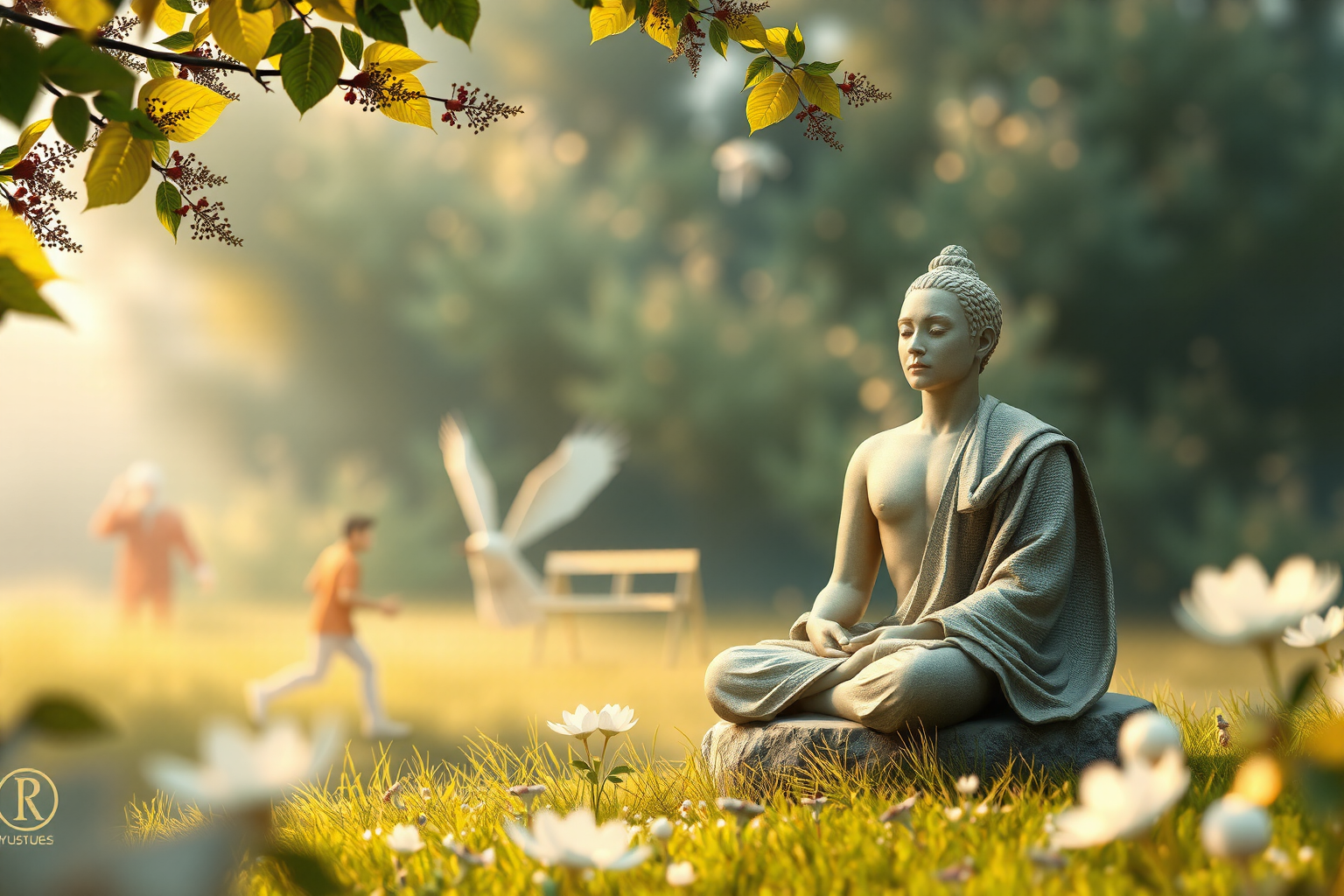Mindfulness-based stress reduction (MBSR) is a powerful tool for managing stress, reducing anxiety, and improving overall well-being. Developed by Dr. Jon Kabat-Zinn, MBSR incorporates techniques such as body scan meditation, mindful breathing, and yoga to cultivate a non-judgmental and present-focused awareness. In this ultimate guide, we will explore the different techniques of MBSR and how to incorporate them into your daily life for maximum benefits. Whether you’re new to mindfulness or looking to deepen your practice, this guide will provide you with the tools to reduce stress and find inner peace.
What is MBSR?
Mindfulness-based stress reduction (MBSR) is a powerful program developed by Dr. Jon Kabat-Zinn in the late 1970s at the University of Massachusetts Medical School. It is designed to assist individuals in managing stress, pain, and illness through the practice of mindfulness meditation and the incorporation of yoga techniques. Typically spanning eight weeks, the MBSR program involves weekly group meetings, a one-day retreat, and daily home practices. Participants engage in various techniques to foster a non-judgmental awareness of the present moment, helping them to cultivate a deep sense of calm and improve their overall well-being.
Participants in the MBSR program typically engage in mindfulness meditation, body scanning, and simple yoga postures, all of which are aimed at promoting present-moment awareness and a relaxed state of being. Through this comprehensive approach, MBSR has been widely adopted in clinical settings and has been the subject of extensive research, exhibiting numerous benefits for mental, physical, and emotional well-being. The fusion of mindfulness meditation and yoga creates a holistic and effective approach to stress reduction and overall health management.
Body Scan
One of the fundamental techniques incorporated into the MBSR program is the body scan meditation. This practice involves a systematic focus on different parts of the body, beginning with the toes and progressing towards the head, all while maintaining a non-judgmental and accepting awareness of the physical sensations. By cultivating a deep, non-reactive awareness of the body, individuals can develop a heightened connection with themselves, enabling them to identify areas of tension or discomfort with greater ease and to develop a profound sense of relaxation and inner peace.
Regular practice of body scan meditation has demonstrated a reduction in stress levels and an improvement in emotional regulation, making it a valuable tool for managing the demands of daily life. By guiding participants to observe and accept their physical sensations without judgment, the body scan meditation empowers individuals with the ability to navigate stress and physical discomfort with greater resilience and ease.
Breathing
Mindful breathing is a core component of the MBSR program, centering on the act of paying close attention to the natural rhythm of the breath. This practice serves as an anchor to the present moment and assists in cultivating a deep sense of awareness and tranquility. By focusing on the breath as it enters and exits the body, individuals can cultivate a heightened state of relaxation and present-moment consciousness, effectively reducing the physiological effects of stress and anxiety.
The practice of mindful breathing can be seamlessly integrated into daily life, serving as a powerful tool for managing stress and inducing a state of calm, particularly in moments of heightened tension or anxiety. By nurturing a deep and non-reactive awareness of the breath, individuals can activate the parasympathetic nervous system, which is instrumental in promoting relaxation and restoring a sense of inner balance and peace.
Deep and slow breathing exercises, a staple of mindful breathing practices, have been shown to effectively reduce stress and anxiety, making them an invaluable tool for individuals seeking to enhance their overall well-being and resilience in the face of life’s challenges.
Movement & Yoga
Integrating mindful movement, such as yoga, into daily routines can yield profound benefits for individuals seeking to alleviate stress and promote physical and emotional well-being. Yoga seamlessly combines physical postures with breath awareness, fostering a deep sense of connection with the body and the present moment. Engaging in gentle and mindful yoga practices not only aids in releasing physical tension and improving flexibility, but also cultivates a profound sense of calm and inner tranquility.
Research has demonstrated the effectiveness of yoga as an intervention for reducing stress, improving sleep quality, and enhancing overall well-being. By harmonizing the body and mind through the practice of yoga, individuals can develop a heightened awareness of their physical and emotional states, empowering them to navigate the challenges of daily life with greater ease and resilience. The intentional integration of mindful movement into daily routines holds the potential to profoundly transform an individual’s relationship with stress and cultivate a deep sense of inner peace and balance.
For Children & Teens
Adapting mindfulness practices to suit the needs of children and teenagers is crucial in equipping young individuals with effective tools for managing stress and cultivating emotional resilience. By introducing age-appropriate mindfulness techniques, such as brief and engaging meditation exercises and mindful movement activities, children and teens can develop an early understanding of the importance of present-moment awareness and emotional regulation.
Mindfulness practices for young individuals can foster a sense of calm, improve focus, and enhance emotional well-being, ultimately laying the foundation for a lifelong ability to navigate stress and anxiety with greater ease. By promoting a non-judgmental and accepting approach to mindfulness, children and teenagers are empowered to cultivate a deep sense of self-awareness and emotional regulation, setting the stage for a future of enhanced mental and emotional well-being.
Walking
Engaging in mindful walking serves as a powerful and accessible form of mindfulness practice, allowing individuals to ground themselves in the present moment and cultivate a deep awareness of their surroundings. By paying close attention to the sensations of movement and the environment, individuals can foster a heightened sense of present-moment consciousness and inner tranquility, effectively reducing stress and promoting emotional well-being.
During mindful walking, individuals have the opportunity to synchronize their breath with the rhythm of their steps, creating a harmonious and meditative experience that serves as a potent antidote to the stresses of daily life. By embracing mindful walking as a daily practice, individuals can imbue their lives with a profound sense of peace and balance, ultimately enhancing their overall well-being and resilience in the face of adversity.
Listening to Music
Listening to music offers a compelling avenue for individuals to engage with mindfulness, allowing them to immerse themselves in the present moment and experience deep relaxation and emotional regulation. By attuning their senses to the subtleties of sound and melody, individuals can cultivate a profound awareness of the present moment and activate the parasympathetic nervous system, promoting a state of calm and inner peace.
Mindful listening to music has been shown to reduce stress and anxiety, making it a valuable tool for individuals seeking to enhance their overall well-being. By embracing music as a mindful practice, individuals have the opportunity to experience a heightened state of emotional awareness and well-being, fostering a deep sense of peace and balance in their daily lives.
Creative Expression
Engaging in creative expression, such as painting, drawing, or writing, serves as a powerful and enriching form of mindfulness practice, allowing individuals to tap into their innate sense of creativity and emotional awareness. By immersing themselves in the process of creation, individuals can transcend the stresses of daily life and cultivate a profound sense of present-moment awareness and inner peace.
Creative expression offers a means for individuals to externalize their thoughts and emotions, fostering a deep sense of self-awareness and emotional regulation. By incorporating creative expression into their lives, individuals have the opportunity to experience a heightened state of inner tranquility and balance, ultimately enhancing their overall well-being and resilience in the face of adversity.
Incorporating into Your Life
Integral to the practice of mindfulness is the intentional integration of mindfulness techniques into one’s daily life, fostering a profound and sustainable sense of well-being and inner peace. By weaving mindfulness practices into the fabric of daily routines, individuals can cultivate a deep and enduring state of present-moment awareness and emotional regulation, ultimately enhancing their overall well-being and resilience.
Whether through the cultivation of a formal meditation practice, the integration of mindful movement, or the engagement with creative and expressive outlets, individuals can imbue their lives with a profound sense of calm and balance, ultimately navigating the challenges of daily life with greater resilience and ease. By approaching life with a mindful and non-judgmental awareness of the present moment, individuals have the opportunity to transform their relationship with stress and cultivate a deep and abiding sense of inner peace and well-being.
Conclusion
In conclusion, mindfulness-based stress reduction (MBSR) offers a variety of techniques that can help individuals manage stress and promote overall well-being. From body scan meditations and mindful breathing to yoga and alternative mindfulness activities, incorporating these techniques into daily life can lead to significant improvements in resilience and relaxation. By cultivating a mindfulness practice, individuals can reduce stress levels and foster a greater sense of peace and balance.


